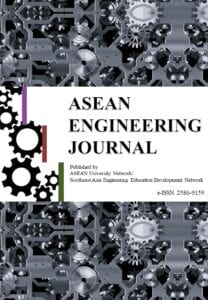APPLICATION OF GENETIC ALGORITHM OPTIMIZATION FOR ORGANIC RANKINE CYCLE WASTE HEAT RECOVERY POWER GENERATION
DOI:
https://doi.org/10.11113/aej.v4.15418Abstract
Waste heat recovery for power generation has lately been widely practiced in process industries. A cement plant of 8,300 ton per day capacity releases 17.5 MWth of flue gas at 360oC to 225oC from its suspension preheater (SP) and 28.0 MWth of hot air at 310oC to 122oC from its air quenching cooler (AQC). The temperature of waste heat from a cement plant is in the lower bound of performace criteria to employing Claussius Rankine cycle (steam power cycle), therefore, organic Rankine cycle (ORC) can alternatively be applied for power generation. Finding the optimum solution of the design pressure and temperature of the ORC for waste heat recovery for power generation (WHRPG) corresponding to the most suitable working fluid is the aim of this study. Genetic algorithm (GA) is being considered for the method to determine the optimum solution. In addition, the technique for order of preference by similarity to ideal solution (TOPSIS) is applied to select the best matched working fluid for the ORC. According to TOPSIS evaluation, amongst four working fluid considered, i.e., isobutane, isopentane, benzene, and toluene, isopentane is ranked at the top in terms of health, safety, environment, power output, and cost critera. The optimum ORC WHRPG design is capable of producing 6,094 kW of electric power with AQC boiler pressure of 11.09 bar-a, SP reheater pressure and temperature of 3.68 bar-a and 184oC, and recuperator and condenser pressure of 1.27 bar-a. The highest pressure of 11.09 bar-a at HP turbine and the highest temperature of 184oC at the LP turbine are relatively low compared to that of steam Rankine cycle power plant, thereby dictate less stringent mechanical and thermal strength of materials requirement.
















